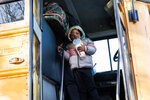


Nearly a third of the unhoused people who left Fayetteville on a bus to a homeless shelter in Durham on Dec. 20 have returned back to the city within a week’s time.
The bus transport, which has been criticized by local activists and concerned residents, was provided freely by the Rockfish Camp and Retreat Center, a representative of the camp said. The voluntary, 90-minute journey to the Durham Rescue Mission’s shelters was coordinated by the Fayetteville Police Department’s Homeless Coordinator DeAnna Braggs, along with Cape Fear Valley Health’s Community Paramedic program and Rockfish Camp and the Durham Rescue Mission.
Four out of the 14 original passengers have returned, according to community advocates who coordinated their return. They said the people who left had not been made fully aware of the shelter’s strict requirements for occupants, including, but not limited to, assisting full-time at the shelter while there.
One of the people experiencing homelessness who was able to get a ride back from the Durham shelter, Rontelle Rately, said he decided to leave after learning that the shelter required occupants to work there at least 40 hours a week at the shelter while being paid only $5 per week for the first six to seven months of staying there. He said he was not informed of this when he talked to a shelter staff member on the phone prior to taking the bus.
“They said I had to wait like, six, seven months in order to work an actual job, make money for myself,” Rately said. “I left the program because I feel like I can get on my feet and find a job way before then.”
Rately also said the shelter staff “mistreat” the people who stay there and lack communication skills.
“I feel like they were taking advantage of us because of our circumstances, by them constantly wanting to put us out about any little thing and constantly bringing it up in our face,” Rately said. “Like, ‘If you don't want to be here, then just leave,’ knowing we ain't got nowhere else to go and it's cold outside.”
Shelter concerns
Community activists say the situation underscores the lack of adequate resources for the homeless community in Fayetteville, especially emergency shelter spaces when temperatures fall below freezing.
Advocates and Fayetteville City Council members have expressed an interest in turning the city’s Day Resource Center into an emergency shelter space, as the Salvation Army shelter is often at capacity. The Day Resource Center was intended to be a central hub where people experiencing homelessness could receive support services for housing and employment assistance from various nonprofit organizations, but it’s unclear to what extent those groups have been at the center offering services. Wheeler said he has not seen that happening, and believes the space could be better served as a shelter for those in need
“We have seen that the Day Resource Center cannot do what they were set up to do now,” homeless community advocate Joseph Wheeler said. “We don't need to do many more practice tries, and we need to just turn that into a shelter,” Wheeler said of the center.
Lisette Rodriguez, a community activist who worked with Wheeler to inform people of the shelter’s requirements before the bus left, said five people who had initially boarded the bus ended up leaving it before departure after learning more about the Durham Rescue Mission’s requirements for staying there.
A flyer containing information about the Durham Rescue Mission’s shelter requirements was shared around the Day Resource Center leading up to the trip. It outlines several standards, some of which are listed on the official website for the shelter.
Among those are:
It is unclear whether Braggs was responsible for the dissemination of the flyers, though CBS17 reported that Braggs had “for days” been passing the flyers out to the homeless community.
Several advocates and people present at the Day Resource Center on Dec. 20 attributed the creation of the flyers to the trip’s organizers, including Braggs and members of the Community Paramedic program.
Unhoused mother Briyanna Miles and her 4-year-old daughter, Briasia, decided last-minute not to board the bus after hearing more about the requirements, and being unable to complete her intake screening before arriving because of unresponsiveness on behalf of Durham Rescue Mission. She said she had been told that the shelter required residents to work there with minimal pay for the first several months of staying there, and was not sure if her child — who has health issues — would receive adequate care there.
A representative for the Durham Rescue Mission said “there's very few reasons anyway that somebody would be turned away.” When asked about a work requirement, the representative said, “Everybody is expected to contribute in some way here. We think that's important. For people to have esteem in their life is to be active and productive.”
Rogriguez criticized Braggs and the city for not doing a better job of educating people about what to expect upon arriving at the shelter.
“There was definitely things missing from that flyer, and that information wasn't really communicated to people properly,” Rodriguez said. “And a lot of people, if we hadn't shown up, a lot of people would have gotten on that bus without knowing the full truth of where they were going.”
Misinformation and miscommunication
City spokesperson Loren Bymer confirmed in an email to CityView Wednesday that neither city management nor city council members were informed that a bus would be taking unhoused people from Fayetteville to Durham. Bymer said Police Chief Kemberle Braden was also not informed about the bus.
This lack of communication caused some concern for community activists, who emphasized that the bus trip was coordinated by a member of the Fayetteville Police Department. It was unclear whether the coordinators of the trip had properly vetted the organization to see if there would be available shelter space at the Durham Rescue Mission for the unhoused people on the bus, according to bus riders.
Miles said the Durham Rescue Mission staff told her it wasn’t guaranteed she would have a place when she and her daughter arrived there — one factor that informed her decision not to go.
“So if we don't get accepted into the facility, we will have to leave,” Miles said, referring to her conversations with a Durham Rescue Mission staff member on Dec. 19. Miles said she was told that they could walk around Durham to other shelters to seek help, but that Durham Rescue Mission would not provide transportation back to Fayetteville if they were turned away.
The city of Fayetteville has said it made sure there was available space for people arriving at the shelter.
“The Durham Rescue Mission was contacted prior to any resident boarding the provided transportation to ensure there was space available and everyone would be able to participate in the programs and services provided,” Bymer said on behalf of the city.
Rodriguez said using the bus as a “resource” to transfer people out of the city was dangerous, especially during the winter, since people not accepted at the shelter may not have been able to stay there upon arrival in freezing temperatures.
“We're shipping our problems to other counties,” Rodriguez said. “Our city officials and our county officials had no idea this was going on. And it's like, nobody wanted to take responsibility, and they still don't want to take responsibility for putting these people's lives in danger.”
Council Member Mario Benavente also criticized the lack of overall communication in the endeavor. Though he said he didn’t object to the idea of providing unhoused people free transportation to a place with better resources to help them, he said he was concerned that chartering the bus was not discussed with city officials — including council members and City Manager Doug Hewett — first.
“I think where there was a mix-up or a ball was dropped,” Benavente said. “We all know that the topic of homelessness and the unhoused community is very sensitive — so run it up the chain. I understand that the folks on the front line are having to make very quick, fast decisions, but this is one of those topics where the city manager needed to be made aware, that city council should have been given some kind of clue that this is truly an effort that the city is working with.”
Three people on the bus who returned were given a ride back by Benavente, who said he was acting in his capacity as a member of the local community organization Cape Fear Indivisible, which funded the return trip. The other individual managed to get enough money for a bus ride back to the city, advocates told CityView Wednesday and CBS17 reported.
The Fayetteville government has distanced itself from the controversial situation in the days after, with comments afterward apparently downplaying the city’s role in the bus trip. In a Facebook post last Wednesday night to Fayetteville’s official government page, the city described the bus trip as a “collaboration with the Day Resource Center, Fayetteville’s Police Department’s Homeless Coordinator, Camp Rockfish, and the Community Paramedics program.”
However, the city’s spokesperson on Wednesday this week denied that the Day Resource Center was involved in the operation, contradicting the city’s previous statements.
“To my knowledge, no one from the Day Resource Center was involved with this effort,” Bymer said in an email to CityView. “The Community Paramedics assisted in coordinating transportation with Camp Rockfish and assisted with much of the leg work in coordinating this entire effort.”
The city has acknowledged that Bragg was a coordinator of the operation, but refers to the bus trip as an initiative of the city’s “partner” organizations. Since the city doesn’t take responsibility for the initiative, Bymer said it would not help people who took the bus.
“Just as the City of Fayetteville didn’t have any resources to provide transportation to the Durham Rescue Mission, there are no resources available in the general fund to bring anyone back,” Bymer said. “This type of effort would have to be coordinated amongst community partners similar to providing optional transportation.”
Rately said he knows some individuals still at the shelter who want to come back to Fayetteville, but don’t have the means.
Miles said she can’t understand why the city and county won’t do more to support the unhoused community, many of whom have jobs or want to work but simply cannot afford the cost of living.
“We don't get any assistance,” Miles said. “We do everything we're supposed to do from the city, but when we need the help, we can't get the help. It's not right.”
Contact Evey Weisblat at eweisblat@cityviewnc.com or 216-527-3608.